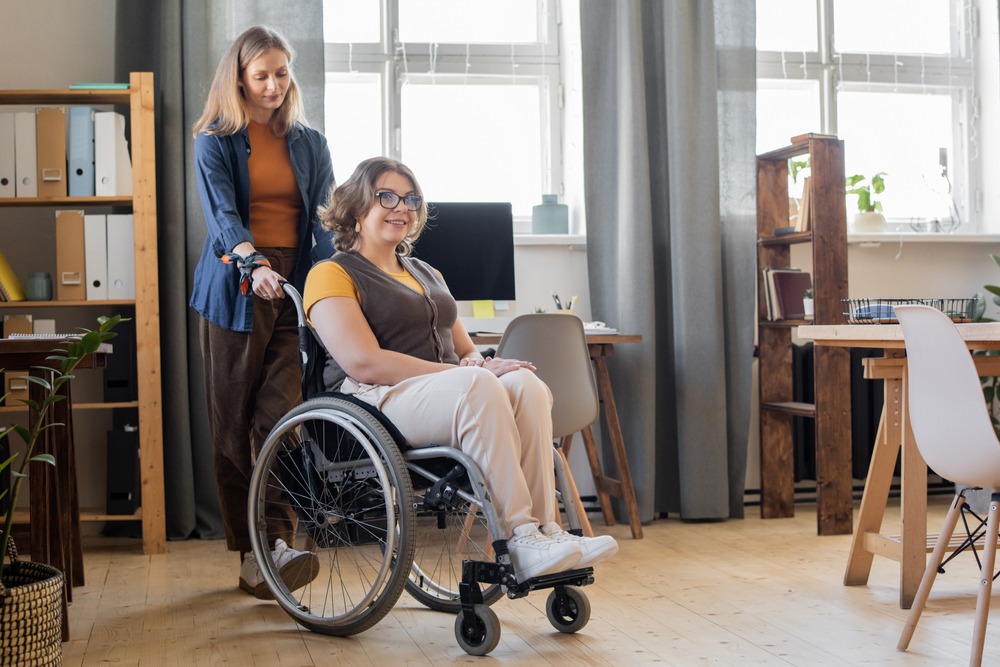Disability in the family
Having a family member who’s disabled doesn’t only affect that family member. Everyone around them wants to help out in any way they can, but that can get messy and complicated when you also have to manage your own life. That’s why it’s vital to get the right support and look after yourself properly. The Mix helps you do just that.

A family of carers
If you have disability in the family, odds are you’re a carer. A research report written in 2020 found that 18-24 year olds make up 8% of all unpaid carers, a number which increased to 10% during the pandemic.
Being a carer can bring about mixed emotions. Sometimes, disability strengthens family life. Mohammed, 20, helps look after his father, who has a lung condition. “I think dad’s illness has made us closer than most fathers and sons. He can’t get out much so he takes a real interest in me and we are good friends.”
However, you can feel trapped by your situation. Kira, 22, fears she will never be able to leave home. “I was 19 when my brother had a brain injury, and now I help mum care for him and my little sister. I love my brother but sometimes he’s violent, which scares me, and I worry that mum won’t be able to cope alone.”
If you’re the parent or main carer of a child with a disability
Don’t struggle alone: “I’m only 24, but I feel 100 sometimes,” says Jo, whose three-year-old daughter has epilepsy and cerebral palsy. “I hardly recognise the carefree person I used to be. But I can’t let myself get upset because who’s going to be there for my daughter if I start to spiral?”
It’s vital to get support before you reach breaking point. Being a carer can be exhausting and isolating, but you’re not alone. Also, getting help for yourself or feeling overwhelmed is not a sign that you love the person you’re caring for any less. There are many others in a similar situation and often talking to someone about your feelings or emotions can help.
“You may be coping on the outside, but inside you might be distressed, exhausted and overwhelmed,” says Elaine Bennett, of Contact a Family. “Parents tell us that the best support they get comes from other families who have been in the same situation, so we help them get in touch.” Parents can also find emotional support on mumsnet, which has a busy special needs forum.
Other ways to ease the stress
Apply for a short break: Spending quality time away from each other can be good for both of you. Some areas run play schemes, befriending services, overnight foster care and after-school clubs for children with disabilities. These are now called ‘short breaks’ – ask your local authority for details, as entitlement varies from place to place. Keep in mind, you may need to be receiving Disability Living Allowance (DLA) to claim.
Get assessed: Are you getting all the help you need? If your child is disabled you have a right to have a needs assessment carried out by your local social services department. You may be eligible for more services and support than you’re currently receiving.
Being the sibling with disability in the family
You’re not alone: “It can be hard for siblings of disabled people to speak honestly about their lives,” says Monica McCaffrey, Director of Sibs. This is a charity which helps people who have disabled brothers or sisters. “People worry that their sibling might put off potential friends: sometimes they avoid socialising rather than mention it. So it can be very beneficial to meet others in the same situation.”
Talk about the future: Your parents may do most of the caring now, but what happens when they get older? “It’s a good idea for siblings to be involved early in discussions about the future,” advises Monica. “Sometimes parents find it hard to let go and let their other children get involved. There might also be conflict about what a sibling thinks their disabled brother or sister is capable of doing; even what they should be wearing.”
Building a good relationship with a sibling: It’s natural for siblings to disagree and argue, regardless of disability or illness. Forming opinions is all part of growing up – but so is learning to express them appropriately. “If jealousy or resentment gets in the way of getting on with your sibling, it’s time to reevaluate. It’s always worth persevering to see if you can compromise and keep the peace,” says Monica.
If you care for a parent or other relative
Look after your body: If you’re aged 18-25 and look after someone for 50 hours or more every week, you’re three times as likely as non-carers to say that your health is ‘not good’. If you do a lot of lifting, or hauling around heavy equipment, it’s good to learn how to do it safely.
Look after your mind: If you’re feeling depressed or anxious, talking about it might help. You can always contact us through our confidential support services. Support – either at the end of the phone or online – is also available through organisations such as Mind and SANE.
Claim your benefits: It’s been reported that 6 out of 10 carers worry about money. If that’s you, Carers UK has information about Carers Allowance and any other payments you (and the person you look after) might be able to claim. You can also find out more about benefits for carers by clicking here.
Next Steps
- Chat about this subject on our Discussion Boards.
By Rosalind Grainger
Updated on 20-Jan-2023
No featured article










